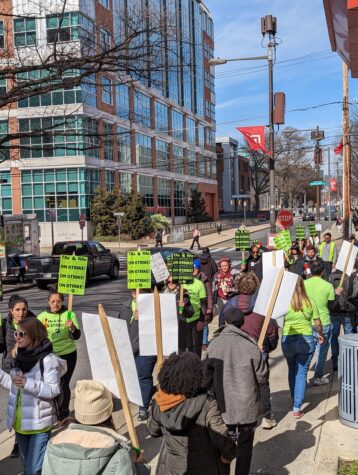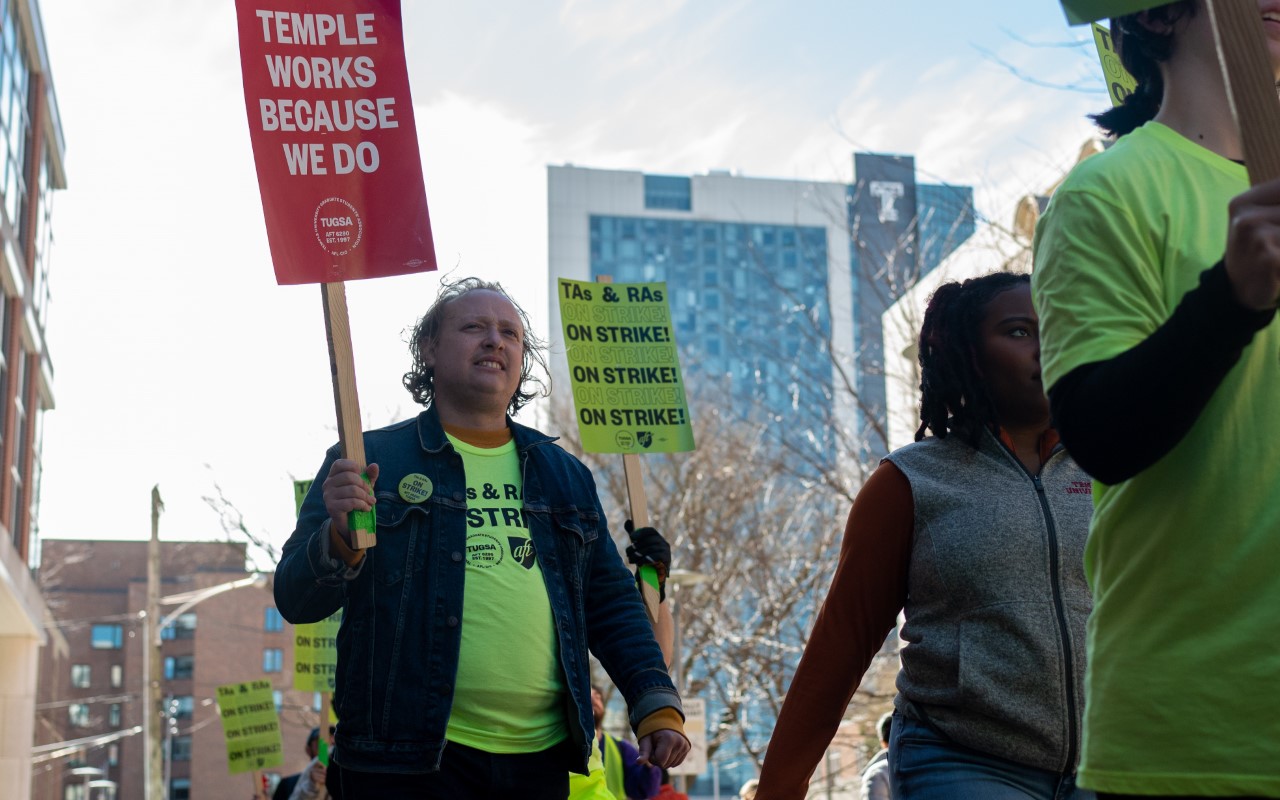TUGSA strike on Temple University. Photo by Robert Joseph Cruz, Photo Editor for The Temple News
After a long and persistent strike, the Temple University Graduate Students’ Association (TUGSA), the union representing 750 graduate student members, has accepted a tentative agreement presented by the university’s administration.
On Monday, March 13, TUGSA presented the proposal from Temple to its graduate student members. Over three-quarters of the members voted, with a resounding 98% voting yes to the new contract according to reporting by the Philadelphia Inquirer.
“We are happy that Temple has finally recognized the value of its graduate employees and that both teams could come to this agreement,” said lead TUGSA negotiator Matt Ford in a news release before the agreement was presented to the members to vote on.
Under the new contract, the minimum pay for graduate students would rise to $24,000 in the first year of the contract, and to $27,000 by the fourth year. Over the life of the contract, this is a nearly 30% increase on the initial $20,700 that graduate students were being paid. Additionally, students who work part-time for over nine months and assist with teaching courses and research will receive a one-time $500 payment.

As for benefits, the contract also includes 25% coverage of health insurance to a graduate’s dependents. This is on top of the full coverage that Temple provides for a graduate’s individual health insurance coverage. Additionally, graduate employees receive up to four consecutive days of bereavement leave and up to 21 calendar days for maternity leave.
In response to the agreement, Temple President Jason Wingard publicly stated his approval that same afternoon. “Over the past six weeks, Temple demonstrated remarkable resilience… Perseverance conquers, and today’s agreement is evidence of our collective willingness to unite and advance,” said Wingard.
Just two weeks after this statement, however, President Wingard would resign from his position with approval of the Temple board. His decision comes after the university’s faculty union, the Temple Association of University Professionals (TAUP), decided to move forward on a vote of no confidence on March 17. The vote would pertain to whether the faculty members believed that Wingard should persist as the university’s president. Wingard’s resignation came before the vote was to be held on April 18.
“While I am confident in my ability to pivot and lead Temple through this crisis, I understand, and it has been made clear, unfortunately, that too much focus is on me rather than the challenges we seek to overcome,” said Wingard in a statement to the Inquirer. He followed his statement by suggesting that, for Temple to overcome its current hurdles, the campus community should work to minimize divisiveness.
According to a Temple News issue prior to his resignation, 92% of the 1,000 students polled on campus disapproved of Jason Wingard.
Information on whether Wingard would receive payment fulfilling his five-year contract is unavailable at this time.

Following Wingard’s decision, the Temple board of trustees released information to the campus community that they would be looking to create a special committee focused on campus safety, enrollment and university relations and engagement. This committee would stay while the university looks for its next president.
Until a new president is selected however, a group of senior university leaders would guide the school in this situation, according to reports from Susan Snyder, a writer for the Philadelphia Inquirer who’s been following news with Temple University since TUGSA began its strike in January.
Mitchell Morgan, the lead chair of the Board of Trustees, said in another statement to the campus community that the group tasked with guiding the university in absence of a president would have “many years of experience at Temple and devotion to its mission.”
Of the senior members selected to be a part of this group is Senior Vice President and Chief Operating Officer Ken Kaiser, who has been at the university for over 30 years. Most recently, Kaiser was responsible for relating updates on negotiations with the TUGSA union during the strike on behalf of the university administration. Kaiser had previously stated that he planned to step down after this semester, but stated to the Inquirer that he planned to stay as of March 28.
“With this change in leadership, the board has asked that I stay on, given my experience and years here at Temple to help guide us in the future and to make Temple the best university it can be,” he said.
Until further notice, the university will be operating without a president, establishing a new committee to focus on the issues that Wingard stated as his top priorities while he was president. With the strike over, many graduate students, including those who did and did not demonstrate, are returning to classes as normally scheduled with their new benefits and pay in tow.
Gaven Mitchell is a second-year History major with a minor in Journalism. GM1001024@wcupa.edu

